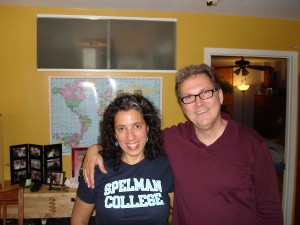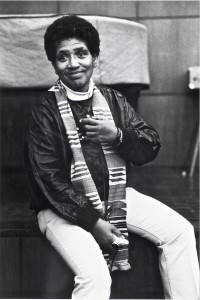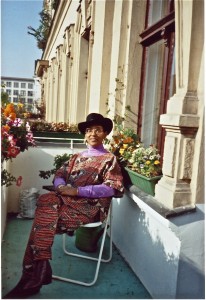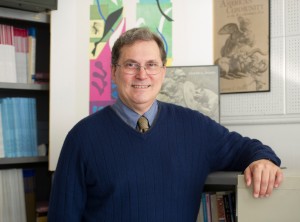Why Commemorate the Life and Legacy of Audre Lorde Today?
By Lester Olson
Unlike many of the contributors to this forum, I did not have the privilege of knowing Audre Lorde while she was alive and doing her work. I never met her. I became aware of Lorde’s voice around the time of her death at Saint Croix in 1992. A text of her 1977 speech at the Modern Language Association, entitled “The Transformation of Silence into Language and Action,” touched my heart and mind so deeply that I wanted to learn more about her and her public advocacy. In retrospect, this suggests something about prevailing practices in higher education during the 1970s and 80s, because I was well trained at universities that ranked among the best research institutions for advanced study in rhetoric and public address. But I cannot recall professors calling my attention to meritorious speeches by any Black women, except Barbara Jordan.
Today, I agree with Lorde that, “There is no hierarchy of oppressions.” So it is important to me, as a white man, to come to terms with racism and sexism as they interact with factors such as socioeconomic class, sexuality, age, gender identity, (dis)ability, religion, and the like. As a gay scholar of modest, rural origins, I believe that serious errors of judgment can result from concentrating only on one’s own oppression, however difficult it can be to deal well with social diversity. I concur with Lorde, too, that each of us should recognize and use our privileges with care. As she affirmed in the Gay Community News, “Unused privilege is a weapon in the hands of our enemies” (January 21, 1990, vol. 17, no. 27, p. 5). So for twenty years now, I have been engaged in research and writing for a book concerning Lorde’s public advocacy. In the process, I have published several essays about Lorde’s life and legacy in such outlets as the Quarterly Journal of Speech (1997, 1998, and 2011), Philosophy & Rhetoric (2000), American Voices (2005), Queering Public Address (2007), The Responsibilities of Rhetoric (2010), The Literary Encyclopedia (2011), and Standing in the Intersection: Feminist Voices, Feminist Practices in Communication Studies (2012). Yet a question recurs: why commemorate Lorde’s life and legacy?
One obvious answer concerns the eloquence of Lorde’s poetry, because she was a prolific poet of international stature. Poems such as “Coal,” “Blackstudies,” “Afterimages,” “Between Ourselves,” “Outside,” “Power,” and “Who Said It Was Simple?” continue to move readers through their rich, evocative language, vivid imagery, and penetrating insight. Her public advocacy took additional forms in an immense and consequential body of discourse consisting of poems, speeches, essays, open letters, pamphlets, and books, all of which can shed considerable light on the history and culture of the United States during the last half of the twentieth century.
Moreover, Lorde’s life, which has been described in Warrior Poet (2004) by Alexis De Veaux, took some difficult turns altering the fundamental contours of her convictions, especially after her diagnosis of breast cancer in the late 1970s. Lorde enacted her commitment to drawing on all of the diverse aspects of herself in defining herself and dealing with her predicaments as an outsider within already under represented, misrepresented, and oppressed communities. She was Black, but not male; a woman, but not white; and a mother, but not heterosexual.
In my 2005 essay in The Responsibilities of Rhetoric, I suggested that Lorde’s earlier experiences of coming to visibility as a self-respecting lesbian informed her later decision to be visible as a breast cancer survivor and warrior by refusing to wear a prosthetic breast, despite overt pressures on her to do so for the comfort of others. As a lesbian, she knew that silence and invisibility exact profound costs that are both personal and political. Her lesbianism was a potent resource for her embodied invention in which even her mastectomy became another source of insight in her public advocacy. Lorde’s Cancer Journals (1980) concentrated on systemic factors that cause breast cancer, such as environmental poisoning, rather than offering merely symptomatic solutions. In 1977, at the MLA, she compared the costs of silence and invisibility concerning sexuality to cancer in her masterpiece. Just as in a commonplace metaphor for cancer as the body betraying itself, silence concerning sexuality or any other heartfelt concerns betrayed and could destroy any meaningful sense of personal identity and communal belonging. I have taught her speech for about twenty years now to my students as a means of encouraging them to come to voice about whatever matters of social justice concern them. Even today, Lorde’s 1977 commentary on the profound costs of silence and invisibility can propel meaningful speech and action.
Beyond what Lorde’s life has to teach us about the history and culture of oppression within the United States, her activism is illuminating today in that she promoted a distinctive strand of feminism of abiding value. Lorde’s advocacy promoted a strand of feminism, which, at the time, was unpopular among women’s rights advocates and even today struggles for recognition and acceptance, despite the fact that it holds considerable promise for a capacious, respectful, and inclusive vision of society. When people describe Lorde as visionary activist, it is doubtless in part because of the specific strand of feminism that she embraced in shaping an inhabitable future for us all. She believed, as did many women within the contemporaneous Combahee River Collective, that oppressions are “interlocking,” not merely intersecting, as is sometimes suggested by reformist feminists today. In a 2012 essay in Standing in the Intersection, I attempted to underscore how much more radical in its implications were the views of Black lesbian feminists such as Lorde during the late 1970s. Lorde articulated clearly that this “interlocking” character of oppression meant that people who were oppressed in particular aspects of their lives might very well nonetheless be oppressive in other regards. In 1982, Lorde asked, “In what way do I contribute to the subjugation of any part of those who I define as my people?” (“Learning from the 60s,” Sister Outsider, 139). She scrutinized specific communication practices as lynchpins of oppression to amplify how oppressions are interlocking, noticing as she did, for examples, how silencing, trivializing, misrepresenting and distorting are routine techniques across various social differences. Were activists to alter these recurring practices, it might be possible to meaningfully transform one’s own role in perpetuating oppression as well as conduct by others.
Lorde’s advocacy is invaluable for reasons that extend beyond her extensive commentary on interacting social biases, because of its artistry while communicating across multiple human differences. She was a brilliant public advocate. Today, Lorde is an iconic figure to several, diverse, communities in the United States and abroad.
It should be added that Lorde engaged in a practice that was subsequently named by Mari Matsuda as “asking the other question,” yet another factor warranting sustained attention to Lorde’s life and legacy. In her classic Stanford Law Review essay, Matsuda explained, “When I see something that looks racist, I ask, ‘Where is the patriarchy in this?’ When I see something that looks sexist, I ask, ‘Where is the heterosexism in this?’ When I see something that looks homophobic, I ask, ‘Where are the class interests in this?’” She observed, “No form of subordination ever stands alone” (Matsuda, “Beside,” 1189). One reason for resistance to these perspectives on interlocking oppressions and asking other questions might be that these views can destabilize and de-center any one social group’s particular representations of community and social justice. Lorde rejected a simplistic identity politics in which binary oppositions between men and women, white and Black, heterosexual and homosexual, financially comfortable and impoverished, and the like could oversimplify the nature of oppressive practices across social differences. She articulated an intricate, coalition politics, which worked actively to transform how people communicate across social differences by concentrating on routine habits and practices.
Lorde’s public advocacy merits serious study today, too, because of the implicit theory of rhetoric embodied and enacted in her public practice of persuasion. One example of this rhetorical theory in action, though there are more, was her practice that I have called shifting sensibilities in a 2011 essay in the Quarterly Journal of Speech. I suggested that Lorde translated Paulo Freire’s insights in Pedagogy of the Oppressed concerning the combined roles of oppressor and oppressed in many people’s experiences into a powerful communication technique in Lorde’s rhetorical artistry. Initially, for instance, Lorde commented on women’s firsthand experiences of patriarchal oppression that her audiences of women would have already known to enable them, subsequently, to recognize their own oppressive uses of similar practices across other differences, such as race, socioeconomic class, and sexuality. Or, when she was dealing with a predominantly Black audience, she would concentrate initially on how racism is sustained by particular communication practices before turning her Black audience’s attention to how they might be reproducing similar practices across differences of sex, sexuality, or socioeconomic class. To my knowledge, this communication technique does not appear in rhetorical theories or standard public address accounts, though it certainly adapts poignantly to the life experiences of relatively dominant members of various subordinated communities — at a cost of adapting to a dominant audience’s consciousness in ways that can tacitly reproduce dominance. In this persuasive technique, attention to Lorde’s advocacy nonetheless has a potential to transform inherited ideas in rhetoric and public address.
Another aspect of what appeals to me about Lorde’s sensibility was her ability to examine and alter her own fundamental assumptions. She engaged in such reconsideration of her most fundamental presumptions throughout her lifetime, a factor which may undergird her shifts of primary audience for her advocacy over the years, as I outlined in my 2011 essay in The Literary Encyclopedia. An example of this active reconsideration of her own presumptions would be her coming to consciousness about diverse meanings of “Black” in international situations, such as her travels to Australia and New Zealand. In other words, there are the instructive examples of Lorde’s 1985 remarks in these South Pacific countries (Burst of Light, 69-72). In Australia, “Black” refers to the indigenous, aboriginal Wurundjeri, while, in New Zealand, “Black” refers to the Maori women. In a journal entry for October 10, 1984, Lorde observed, “When an African-American woman says she is Black, she is speaking of her cultural reality, no matter how modified it may be by time, place, or circumstances of removal. Yet even the Maori women of New Zealand and the Aboriginal women of Australia call themselves Black. There must be a way for us to deal with this, if only on the level of language. For example, those of us for whom Black is our cultural reality, relinquishing the word in favor of some other designation of the African Diaspora, perhaps simply African” (Burst of Light, 67). Such reflections suggest that while Diasporic sisterhood mattered profoundly to Lorde, her vision of sisterhood extended beyond an African heritage to encompass the Black women of New Zealand and Australia who were not of African descent. I admire Lorde’s capacity to broaden her vision to embrace differences of understanding in other cultures and nations. As this example also illustrates, Lorde’s public advocacy enacted her transnational approach to dealing with cultural differences long before the idea emerged in academic scholarship in American studies. Especially during the last seven or eight years of Lorde’s life, she sought to build coalitions within and across national boundaries to transform oppressive practices within nations, while cultivating solidarity across international boundaries. Lorde did not engage in such public advocacy abroad as though she had the solutions in hand for the problems in other nations. Rather she sought actively to transform herself by learning from others, even as she proposed specific approaches to dealing with social differences. Lorde’s 1985 speech in Australia is fine example of her transnational interventions as an African American within the specific power dynamics particular to Australia.
I offer these thoughts as only a few of the many reasons that Lorde’s life and legacy merit ongoing attention and public commemoration. I am grateful to Dr. Elizabeth Lorde-Rollins for having entrusted me with access to her mother’s otherwise closed papers at Spelman College back in 2002 so that I could endeavor to do my work, while learning from how Lorde undertook hers.
________________________________________________________________
Professor Lester C. Olson is the Chair of the Department of Communication at the University of Pittsburgh, where he holds a secondary appointment in the Gender, Sexuality, and Women’s Studies Program and he specializes in public address, visual rhetoric, and human rights rhetoric. His books include Emblems of American Community in the Revolutionary Era (1991), Benjamin Franklin’s Vision of American Community (2004), and, with co-editors Cara A. Finnegan and Diane S. Hope, Visual Rhetoric (2007). His most recent book is Human Rights Rhetoric: Traditions of Testifying and Witnessing (2012) with co-editor Arabella Lyon. His essays concerning Audre Lorde’s public advocacy can be found in the Quarterly Journal of Speech (1997, 1998 and 2011), Philosophy & Rhetoric (2000), American Voices (2005), Queering Public Address (2007), The Responsibilities of Rhetoric (2010), The Literary Encyclopedia (2011), and Standing in the Intersection: Feminist Voices, Feminist Practices in Communication Studies (2012).








Pingback: Afterword: Standing at the Lordean Shoreline - The Feminist Wire | The Feminist Wire